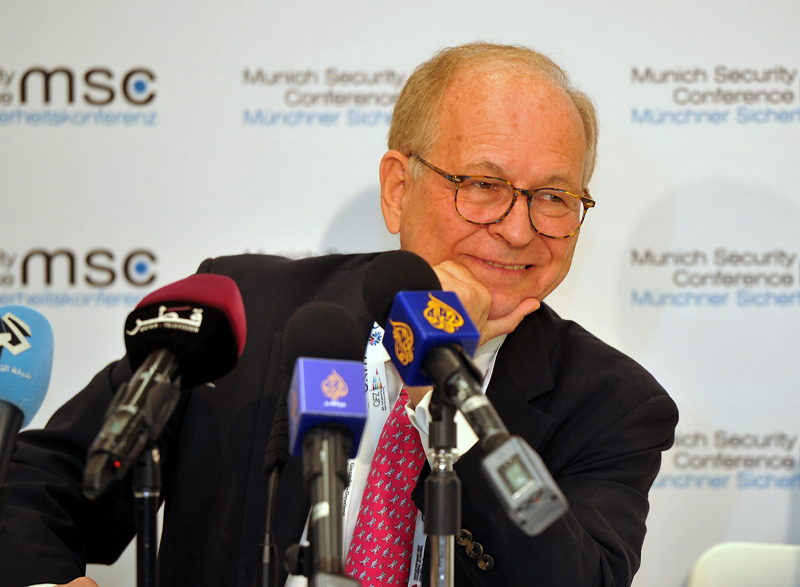
Deputy Prime Minister and Minister of Foreign Affairs, H E Sheikh Mohamed bin Abdulrahman Al Thani, during the Munich Security Conference Core Group Meeting at Qatar National Museum.
Doha: The Chairman of the Munich Security Conference (MSC), Wolfgang Ischinger, has said that end of non-dialogue between important players of the region is necessary to address serious security problems of the Middle East.
He was addressing a press conference after the Munich Security Conference Core Group Meeting hosted by Qatar at the National Museum of Qatar yesterday.
To a question about the Gulf crisis, Ischinger said that as a practicing diplomat he had felt an increasing awareness by all sides that it could not go eternally and must end.
“In my personal assessment, all diplomatic issues at the end of the day also see the question of face-saving, therefore a solution necessarily needs to be structured in a way that is a win-win situation for all sides,” he said.
He noted that awareness was rising that the Gulf crisis must end because other issues were so overwhelmingly important that the region could not afford the speechlessness between important players of the region.
He said that in diplomacy there was nothing impossible. “Miracles in foreign policy happen if we are optimistic and committed.”
He said that in the Core Group Meeting there was emerging consensus by everybody that volatility of the situation in this region demands a well-thought initiative in order to bring everybody on the table, and overcoming non-dialogue was urgently required.
Ischinger said that unresolved problems of the Middle East were one the biggest challenges for international peace and security, therefore, they should be on the top level of the list of priorities.
Ischinger said that the nature of the situation in the region which was facing many challenges like Syria, Yemen, Libya and elsewhere was also different on the grounds that many governments were not speaking to each other.
“In the absence of transparent dialogue between different governments of the region, this organization (Munich Security Conference) can make a modest contribution by providing a platform.”
Held under the auspices of the Ministry of Foreign Affairs, the meeting was attended by high-level representatives of governments, international institutions, and academics.

Wolfgang Ischinger, Chairman of the Munich Security Conference during the press briefing of Core Group Meeting 2019 in Doha at National Museum of Qatar yesterday. (Pic: Abdul Basit/The Peninsula)
The Munich Security Conference Core Group Meeting provides a platform for discussion between 60 to 80 high-level political decision-makers, experts and representatives of international civil society organizations from the region and their counterparts from Europe and the rest of the world.
Deputy Prime Minister and Minister of Foreign Affairs H E Sheikh Mohamed bin Abdulrahman Al Thani said in a speech prior to the start of the meeting that the main objective of hosting the meeting comes within the framework of the efforts made to reduce the repercussions of the issues in the region, which afflict many countries of the world, as well as the challenges of the Gulf in particular, QNA reported.
His Excellency welcomed the participants in the meeting, wishing them a pleasant stay in the State of Qatar, and hoped that the discussions will lead to the achievement of effective solutions that can benefit everyone, it added. In the press conference, Chairman of the MSC, Wolfgang Ischinger, thanked Amir H H Sheikh Tamim bin Hamad Al Thani, Qatar government and in particular Qatar’s Deputy Prime Minister and Minister of Foreign Affairs for hosting Munich Security Conference Core Group Meeting in Doha.
“It is not the first Core Group Meeting in Doha as we met here in 2013 but now situation of 2019, of course, is different with severe risks of conflict and number of ongoing conflicts in the region.”
He said that during the meeting some participants had spoken of the risks of larger wars in the region which showed the assessment of seriousness of situation in the Middle East among the participants.
He said that the MSC was not a conflict resolving body like the UN but offered a modest contribution by providing a platform to discuss different international problems.
He said that the Munich Security Conference had held a meeting in Cairo two days ago because there were some countries which could not, would not come to Doha and there were also some countries which could not, would not go to Cairo.
He said that Iran’s Foreign Minister, Dr. Mohammad Javad Zarif, participated in the meeting in Doha and presented different ideas including Hormuz Peace Deal in the presence of US representatives therefore the Munich Security Conference was working as a bridge-builder.
He said that at the end of the day every problem had to be resolved through dialogue. “In the meeting representatives from the European countries were present and the European countries have the experience on how to end dividing lines, mutual threats and confrontations.”
To a question, he said that in his opinion Europe had missed the boat and failed in taking serious initiative to end fighting and war in Syria or find a solution. He said that looking away was not an option for Europe as the fallout would end on Europe’s doorsteps.




